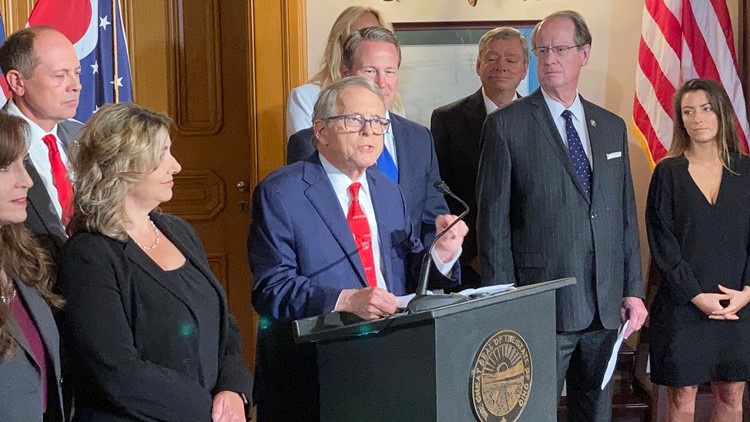Refunding fines to Ohio businesses cited for violating public health orders during the coronavirus pandemic would send a “horrible” message to the vast majority of companies that followed the rules, GOP Gov. Mike DeWine said Thursday as he explained why he vetoed the budget provision.
The measure included in the budget by fellow Republican lawmakers would have stopped disciplinary actions against companies and refunded payment of any fines. The move was one of several pushed by GOP legislators challenging actions DeWine took to slow the spread of the coronavirus. Total fines were only estimated at about $100,000.
DeWine said he was grateful to most businesses who “did phenomenally well" working under restrictions during the pandemic. By contrast, he said, a small number of firms were cited by state liquor control agents, sometimes repeatedly, for violating health orders. Such orders included the statewide mask mandate, limits on crowd size, and required social distancing.
To tell those businesses there are no consequences for their actions “would send a horrible, horrible, horrible message,” DeWine said.
DeWine also vetoed a Republican measure that would have allowed the House speaker and Senate president to intervene in legal challenges to the upcoming process of creating new, more representative legislative districts. DeWine called this an unprecedented violation of the separation of powers.
“It is virtually unheard of for state or federal courts to permit members of the General Assembly to intervene in lawsuits,” DeWine said, noting that Republican Attorney General Dave Yost, who represents the state in court, had asked for the veto.
Disappointing, abortion rights advocates, the governor left in place new mandates that physicians who provide backup coverage at local hospitals as part of required patient-transfer agreements with abortion clinics must practice within 25 miles (40 kilometers) of the clinics.
DeWine also left in place language allowing doctors and other medical practitioners, hospitals and insurance companies to refuse to perform or pay for procedures that violate the individuals' or institutions' conscience on moral, ethical or religious grounds.
DeWine said the provision merely sets into state law what's already being practiced. Opponents said it was a move to further limit abortions.
“The religious refusals in this budget are nothing but a license to discriminate against people’s healthcare decisions,” Elaina Ramsey, executive director of the Ohio Religious Coalition for Reproductive Choice, said in a statement.
The two-year, $75 billion budget that went into effect Thursday includes a new system for funding K-12 education that both Democrats and Republicans believe will create a fairer and more reliable long-term payment system.
For the first time, the Fair School Funding Plan sets the base amount of money spent on each child on the total per pupil cost of an education, from the transportation budget needed to bring children to school to the computers they're issued to do homework on at the end of the day.
Going forward, that base amount is about $7,200 per child, up from $6,020 in current law.
The new system will also do away with a guarantee that districts don't receive less money from budget cycle to budget cycle, regardless of their actual expenses. It also eliminates what are known as caps, which limit how much additional money districts can receive year over year, regardless of their need.
The new school funding plan also allows direct state payments to charter schools, rather than the money coming from districts.
DeWine called it a budget "that invests in Ohio, a budget that invests in the people of Ohio, and a budget that invests particularly, particularly in our children. He also noted the budget passed by wide bipartisan measures in the GOP-controlled House and Senate.
“This budget speaks to what pulls us together, and reminds us that we have so much more in common than the things that pull us apart,” the governor said.
Among other spending measures, the budget provides $250 million for grants to help deliver broadband access to underserved and rural communities, and $170 million for the state's clean water initiative meant to reduce runoff into lakes that can create toxic algae blooms.
The budget also spends $10 million to help local police departments buy or boost body-worn camera systems, and $8 million in grants meant to help communities reduce violent crime.
In addition, the budget enacts a 3% personal income tax cut, and also raises to $25,000 the minimum amount Ohioans must earn before they have to pay state income taxes. Critics say the tax cut benefits mainly wealthy Ohioans.



